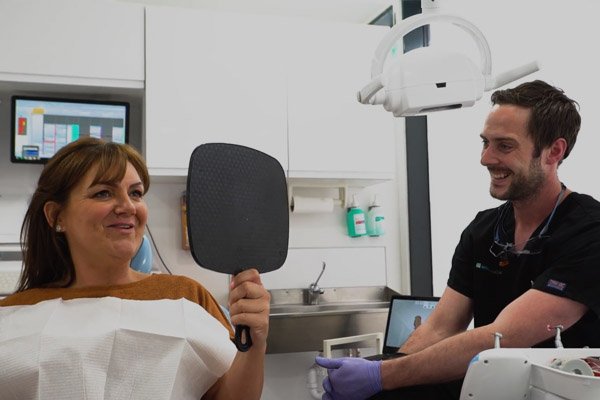Posts Tagged ‘tooth decay symptoms’
Signs You Should See Your Dentist
Monday, May 8th, 2017
Why Is It Important To See Your Dentist?
Regular dental check-ups are vital for maintaining the best oral health. Your smile is one of the first things anyone notices, and keeping it healthy and beautiful is important. Small aches and pains may not appear serious, but with time they can progress, leading to serious problems such as tooth decay and gum disease. So, when you notice something wrong with your teeth or gums, make sure to book an appointment at the Brite group as soon as possible.
Signs That Something May Be Wrong
Some of the most common signs of problems with your teeth or gums may be:
- Swollen or bleeding gums
- Teeth that are sensitive to hot or cold, or to sweet foods
- Pain or swelling around a tooth
- Wisdom teeth issues
- Jaw pain
- Loose fillings, crowns, bridges, or dentures
- You have an ongoing medical condition such as diabetes
- Changes to our life such as pregnancy or cancer treatment
Another reason to see your dentist may be more psychological than physical. The appearance of your teeth, such as their colour or if they are uneven or crooked, may make you feel unhappy with how you look. The Brite team is on-hand to offer a range of cosmetic treatments that can help you to feel confident again. These include teeth whitening, dental implants, invisible braces and many more.
Even if you don’t have any current issues, regular check-ups are still really important. If you visit as much as your dentist thinks is necessary (this can vary from person to person, depending on your oral health) they can spot any potential problems early on, and can offer treatment to stop tooth decay or gum disease from progressing.
What Could Happen If You Don’t See Your Dentist?
Tooth decay and gum disease can lead to serious issues if not treated. Without help from a dentist, these conditions will progress and worsen over time, until teeth become weak and loose. They may also cause you severe pain which can be eased with a dental visit. Acute conditions such as infections also need immediate treatment in order to keep your mouth in the best condition. Dental hygiene is important for staying in good health.
Keep Putting Off Your Visit? Don’t Worry, We Can Help
If you think you may have a cavity or a loose tooth filling, but you’re nervous about going to the dentist, don’t panic! Brite Dental has a friendly, qualified team that will help you to relax and make it through your appointment in a pain-free, calming environment. The Brite team will take time to evaluate your needs and will take into consideration the bigger picture, addressing any worries before treatment starts. Our experienced team will then put together an individualised treatment plan. So contact us today to book your next appointment.
How To Avoid Cavities
Wednesday, November 2nd, 2016
Cavities are the most common problems dentists see. Left untreated they lead to tooth decay, gum disease or even health problems. At Brite Dental, we care that you have healthy teeth and a healthy smile so we’ve put together a few tips about cavities and how to avoid or treat them.
What Is A Tooth Cavity?
Tooth cavities simply mean holes in teeth. Our mouths are full of harmless bacteria but sometimes these attach themselves to the hard enamel surfaces of teeth and multiply rapidly. Once mixed with proteins in saliva, bacteria become the whitish plaque that we see around our teeth. If this isn’t removed the acid in it causes tooth decay, tooth cavities and gum disease as it dissolves your tooth enamel. Once tooth cavities have allowed bacteria access to the dentin inside your tooth, pain sets in and you will need a tooth filling to prevent further tooth decay or gum disease.
How Can I Avoid Tooth Cavities And Gum Disease?
Gentle, but thorough brushing of your teeth and gums twice a day is your first line of defence against developing a tooth cavity or gum disease. Use gentle back and forth movements, remembering to brush your tongue as well. Daily flossing adds an extra level of defence against developing a cavity, letting you remove food particles your toothbrush couldn’t reach. Finish your dental routine with an antibacterial mouthwash. Designed to fight bacteria they also leave you with fresh smelling breath. Limiting your intake of sweet food and drink is also very important as sugars react with the bacteria in plaque producing the harmful acids that lead to tooth cavities. If you do indulge in a treat remember to brush afterwards. Finally, regular check-ups at Brite dental enable our team to deal with small problems before you need a tooth filling or suffer more serious damage to your teeth and gums.
How Does The Brite Group Treat Cavities?
There are four main stages to cavity treatment with the aim of dealing with it before further tooth decay and gum disease sets in. When a cavity first appears we offer advice on diet and a fluoride covering may be applied to the area. A tooth filling may be needed to remove the decay and the cavity left behind filled with a safe substance. Don’t worry, a tooth filling is always carried out under local anaesthetic. If your tooth cavities have spread into the pulp or centre of the tooth then this may need to be removed. This root canal treatment prevents further tooth decay and the risk of gum disease. If the damage is too severe for a tooth filling, then teeth may need to be removed. Our Brite team will advise on this and how missing teeth can be replaced with partial dentures, bridges or implants.
Remember regular check-ups at Brite Dental will ensure we get to problems before the pain starts, a tooth filling is needed or gum disease sets in. So what are you waiting for? Contact your local Brite Dental today and we can help you look after your smile.







